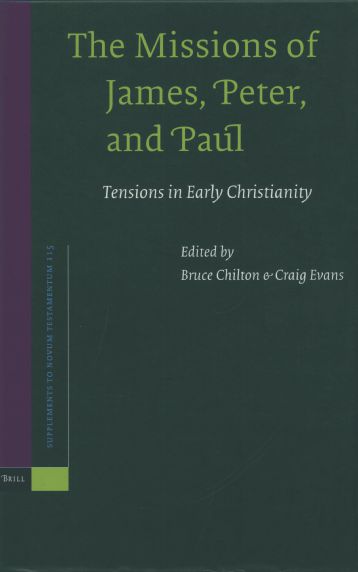 While reading a commentary on James I came across references to Chilton & Evans (eds.), The Missions of James, Peter & Paul: Tensions in Early Christianity. It looked interesting enough for me to look for it on Google, check the table of contents, and look at a review. The review by Pieter Lallemann was not too complimentary:
While reading a commentary on James I came across references to Chilton & Evans (eds.), The Missions of James, Peter & Paul: Tensions in Early Christianity. It looked interesting enough for me to look for it on Google, check the table of contents, and look at a review. The review by Pieter Lallemann was not too complimentary:
This sequel to James the Just ( 1999) contains 16 essays by 10 scholars who set out to consider the three missions against their Jewish backgrounds. In two contributions Jacob Neusner presents much rabbinic material for comparison and then uses this to maximize the differences between James and Paul. Richard Bauckham likewise takes his point of departure in Jewish material—views on the impurity of Gentiles—but he rather uses it to argue for basic agreement between, and the historicity of. Gal. 2 and Acts 11 and 15. This is the essay to which I would give pride of place. It is comprehensive and convincing. In the following essay John Painter goes over much the same ground and also involves Matthew in the comparison, to draw conclusions which differ markedly from Bauckham’s.
Two very useful studies discuss archaeological evidence: Marcus Bockmuehl on Bethsaida and its connections with Simon Peter; Evans on Peter, James and contemporary burial practices. There are straightforward comparisons of the attitudes of Paul and James to such issues as the use of rhetoric (Painter), judgment (Marianne Sawicki), charity, riches and poverty (Peter Davids), and suffering (Davids). Chilton argues—I think unconvincingly—that James was a Nazirite. The contributors differ in their assessment of the value and reliability of the accounts in Acts 11 and I5, and as to whether the Epistle of James primarily has a Jewish (Davids again) or a Hellenistic (Wiard Popkes) background. The volume is presented as the outcome of several conferences (p. 211), but there are neither responses nor summaries, the essays do not interact and are not even cross-referenced. It would have profited immensely from some real editing. Its price would lead us to expect just that (JSNT 28:5 (2006), 16).
Still, our library did not have it and I thought it could be a useful addition. Until I checked the price: A$309.31 (freight-free). Ai-ai-ai! The book is hardback, over 500 pages in length, and published by Brill; nevertheless, some books just cost too much!
It may be more than a little bit naughty, but for anyone interested, I also found a PDF copy online which I have dutifully saved…
I agree with your comment about Bauckham, and I also like Peter Davids who authored the NIGTC on James, as well as commentaries on 1 Peter. His commentary on James is relatively brief, incisive and insightful. I don’t know if I have ever read any Chilton. If the book was not so expensive I would have ordered it for the library. I don’t know the work of Neusner although I have heard of him. Thanks for the heads-up!
I just read the link you included: almost 1000 books! No wonder I had heard of him! “Most published man in history!”
One wonders whether the AFP are currently smashing down doors to catch the copyright thieves taking advantage of the illegal download? Or perhaps the audience is small and august enough. Academic book pricing is rather ridiculous when it routinely alternates between completely open access (eg: much of Monash University Press’s output) or low-cost (eg SBL) and the insane figures dreamt up by the like of Brill, Continuum (or whichever multinational owns them now) and their ilk.
Hopefully they have more important things to do :P.
I don’t know who put it up. I thought I was clicking on a review but it was the whole book. I would have bought the book if it were reasonably priced.
Murdoch also have on online repository of theses which may consequently limit the sales of books based on those theses. My own thesis at Murdoch has been downloaded over 700 times, I think; far more copies than the book has sold! But I do hear of sales of the book from time to time. Ian Packer told me he bought it a few weeks ago. Yay!